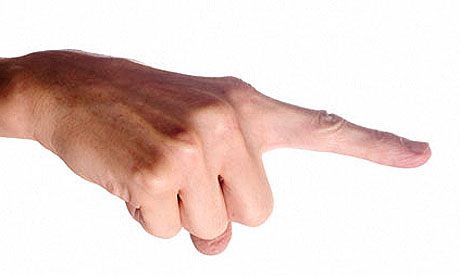As the inevitable rows on prize juries testify, it's not easy to say – but well-informed argument does provide some useful pointers
Rick Gekoski - guardian.co.uk,

A finger pointing. Photograph: Phil Portus / Alamy
Martyn Goff – formerly the administrator of the Man Booker prize, a puckish and highly literate man about town, novelist and these days a rare book dealer – used to say that choosing a Booker winner was simple. "Just pick the best book," he would advise, knowing full well that that was where the problems – and the fun – started. Martyn loved problems, and had a great sense of fun, leaking judges' disagreements to the press, keeping the pot boiling, stirring merrily.
He was fully aware that prize judges have strong opinions and individual tastes – he liked picking ones that did – and that they will always come into conflict. Never, he once told me, have the judges been unanimous about the winner of the Booker, though now and again they all left the final judging room tolerably happy. But he relished the clash of ego and opinion in the judging process. The judge he had most respected was George Steiner. Why was that? "He knew how to get his own way."
Martyn was also clear, though, that it was up to individuals, and individual panels, to decide what counted as best, and would not, under any conditions, suggest the criteria that might be applied to such a choice. I think this was wise of him, and that the hoo-hah at this year's Man Booker, with Stella Rimington wanting books to read rather than to admire, and Chris Mullin favouring those that "zipped along", was caused not by the fact that these are dubious criteria, but that they are criteria at all. Better just to make one's choices, and let the world react.
I was once asked, at some festival or other during a time when I was judging the prize, what my criteria were for defining a great book. Now I must admit that, like a lot of arts people, I have an instinctive revulsion against rules. Art is by its nature often transgressive, and most of us trained in the arts do not like to be told what to do, whether by people or by formulae. We associate rules and "criteria" with busybody administrators and bureaucrats, and resist reflexively when asked to justify ourselves according to some pre-set formulation or standard. Though by no means hostile to rational discourse of more conventional kinds, we often rely on intuition, particularity, taste, and an individuated critical eye. We like to think of ourselves as free spirits, which is one of the sustaining illusions of the whole enterprise.
Full story at The Guardian.
He was fully aware that prize judges have strong opinions and individual tastes – he liked picking ones that did – and that they will always come into conflict. Never, he once told me, have the judges been unanimous about the winner of the Booker, though now and again they all left the final judging room tolerably happy. But he relished the clash of ego and opinion in the judging process. The judge he had most respected was George Steiner. Why was that? "He knew how to get his own way."
Martyn was also clear, though, that it was up to individuals, and individual panels, to decide what counted as best, and would not, under any conditions, suggest the criteria that might be applied to such a choice. I think this was wise of him, and that the hoo-hah at this year's Man Booker, with Stella Rimington wanting books to read rather than to admire, and Chris Mullin favouring those that "zipped along", was caused not by the fact that these are dubious criteria, but that they are criteria at all. Better just to make one's choices, and let the world react.
I was once asked, at some festival or other during a time when I was judging the prize, what my criteria were for defining a great book. Now I must admit that, like a lot of arts people, I have an instinctive revulsion against rules. Art is by its nature often transgressive, and most of us trained in the arts do not like to be told what to do, whether by people or by formulae. We associate rules and "criteria" with busybody administrators and bureaucrats, and resist reflexively when asked to justify ourselves according to some pre-set formulation or standard. Though by no means hostile to rational discourse of more conventional kinds, we often rely on intuition, particularity, taste, and an individuated critical eye. We like to think of ourselves as free spirits, which is one of the sustaining illusions of the whole enterprise.
Full story at The Guardian.
No comments:
Post a Comment